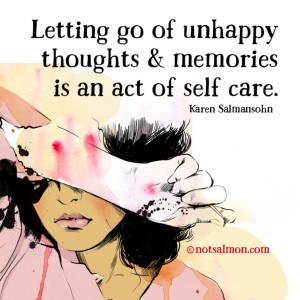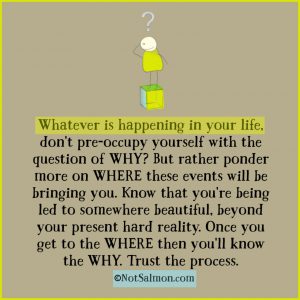(NOTE: This tool is for those dealing with depression due to challenging events. If you’re suffering from chemically related depression, this treatment and management might help, but please see a doctor.)
 My mother loves to tell the story of how I first learned to walk.
My mother loves to tell the story of how I first learned to walk.
“Karen learned to walk in basically one day,” my mom loves to say. “Karen got up, took a few steps, fell down, giggled. So she got up again – dusted herself off – took a few more steps. Once again she fell down. Once again she giggled. Karen kept doing this – over and over – until by the end of the day Karen was walking.”
I’ve always wondered if my mom’s time description of “24 hours to walking” was accurate.
But I never doubted her accuracy when it came to describing me as giggling upon landing on my toosh.
All my life I’ve instinctively tried to find humor in tough situations – then dusted myself off, and kept on moving forward.
However….
 There have been admittedly those “you-gotta-be-freaking-kidding-me” tough times – when I could not find the will to laugh – nor find the will to get up from the sofa.
There have been admittedly those “you-gotta-be-freaking-kidding-me” tough times – when I could not find the will to laugh – nor find the will to get up from the sofa.
I’d simply lay there in the fetal position, feeling as if someone hit the “off switch” on my brain, my heart, my personality. I no longer felt like my normal, positive self.
My depression triggers were caused by…
Because I love to read and write about happiness, during majorly tough times I’ve gone into research-mode.
As a result, I’ve developed a range of tools which have saved me during times of depression.
Today I want to share one amazingly effective depression tool.
My Bi-focal Lens Tool To Help Manage Depression
 Recently there’s been new brain research which explains why my BI-FOCAL LENS TOOL can be so effective at managing depression.
Recently there’s been new brain research which explains why my BI-FOCAL LENS TOOL can be so effective at managing depression.
Before I explain how to use my BI-FOCAL LENS TOOL, I want to first share this recent brain research on depression, so you fully understand why this tool might help.
Important Depression Research:
This new brain research comes from a study done by the UK’s University of Warwick and China’s Fudan University. These researchers discovered that depression affects a part of the brain called the Orbito Frontal Cortex (OFC).
The Brain’s OFC is divided into 2 parts:
Brain Part 1: the lateral OFC
…which becomes active following non-reward. For example, after not receiving an expected goal, relationship, job, prize – or after unpleasant experiences like losing money etc… This new research shows how the lateral OFC is connected to an individual’s sense of self – and depression follows because a person winds up feeling personal loss and low self-esteem.
Brain Part 2: the medial OFC
…which is a reward circuit – and it stops working during tough times – because it stops being connected to rewarding thoughts– like happy memories or positive thoughts about the future. This leads to depression because the less you’re connected to rewarding thoughts – the more you dwell on depressing stuff.
As a result of this depression research, neuroscientists realized something important.
If you want to treat depression, you need to ….
- increase your sense of self (improve your lateral OFC)
- tap into rewarding thoughts about the past & future (improve your medial OFC)
My Bi-focal Lens Tool for Depression does exactly those 2 things!
So, what does it mean to use a “bi-focal lens”?
It means you focus on both your short term vision and long term vision.
For example…
Bi-focal Lens 1: Your short term vision of your life
You take charge of seeing the good right smack in front of you and right smack inside of you – even if this means you need to “manually” self-create something good in your present to lift your self-esteem. This will help you with your lateral OFC – by improving your connection to your sense of self. (Note: Examples to come below!)
Bi-focal Lens 2: Your long term vision of your life
You take charge of seeing the good which has already come to you in the distant past and the good which is due to come to you in your distant future – even if you need to “manually” force yourself to remember the good in your past and/or “self-create” something good to look forward to in your future. This will help you with your medial OFC, by improving your connection to rewarding thoughts. (Note: Examples to come below)
A Step By Step Guide For Using A Bi-focal Lens for Depression
Let’s say you’re dealing with a money challenge, break up challenge, health challenge, etc. You’re feeling overwhelmed, anxious, fearful, and confused. Make sure each day you force yourself to do at least…
- 1 habit from a SHORT TERM LENS CATEGORY
- 1 habit from the LONG TERM LENS CATEGORY
3 habits to improve your short term lens
1. Do an action you’re proud of!
 When you do actions you’re proud of you increase your self-esteem.
When you do actions you’re proud of you increase your self-esteem.
This is exactly what your lateral OFC is hankering for – an improved sense of self.
- You can buy the stranger behind you at Starbucks a coffee.
- You can write a loving text or email to someone you care about.
- You can also exercise – and get double the perks.
When you exercise you get all those mood-improving serotonin and dopamine benefits.
Plus you get the emotional benefits of doing an action you’re proud of – which boosts your self-esteem!
2. Journal about 1 positive habit or happy experience

This will train your brain to focus on all the good you’re doing and enjoying in the present.
Remember: Your lateral OFC is challenged, because it got “set off” after “not receiving an expected reward – or after unpleasant experiences like losing money etc.”
You re-boot your sense-of-self every time you write down all the things you are doing right.
Plus, you re-charge your self esteem every time you remind yourself of all the things you’re capable of controlling.
(This is especially needed when your world feels out of control.)
Plus when you know that at the end of each day you must report something good you did, then you will be more aware throughout your day of wanting to do more positive behaviors.
3. Meditate. Retrain your brain to be fully present.
When you learn how to be “in the now,” you master control over your inner-bully thoughts and self-sabotaging habits.
Plus as I’m sure you know, infinite studies report how meditation increases levels of happiness and reduces stress.
I also believe that because meditation is an action you can be proud about doing, you will also boost your sense of self – because you’re doing such a self-loving habit. It’s win/win/win!
Hate meditating? Feel you don’t have time to meditate?
Try doing 2 minute meditations – like I share in my book Instant Calm.
These meditation tools are fun and simple to do – because they’re based on using your 5 senses (sight, sound, touch, smell, and taste).
Instant Calm is great for beginners to meditation – as well as advanced meditators – because there’s something for everyone. Learn more here!
Try these 3 habits to improve your longterm lens
1. Write down 5 things from the past for which you’re grateful.
By scanning your past for positive events, you’re re-training your brain to connect to rewarding memories instead of obsessing about the negative – and this helps your medial OFC.
2. Visualize happy future goals and dreams
Plan specific happy events with loved ones.
Visualize these happy scheduled plans as well.
You reconnect to rewarding thoughts every time you visualize a happy future scenario – which will help your medial OFC.
 Plus I’m a big believer in the power of visualization for many reasons.
Plus I’m a big believer in the power of visualization for many reasons.
Numerous studies have proven how merely imagining positive circumstances sends blood flowing from negative brain regions to positive ones.
In fact, when you visualize doing an action, you stimulate the same brain regions as you do when performing that action.
For example…
if you visualize lifting your left leg right now, you will stimulate the brain region that gets activated when you truly lift your left leg. Because visualization is so powerful, many professional athletes have trained for events by visualizing successful results, thereby increasing their likelihood of attaining them. Ditto for you improving your success if you take time to visualize success.
3. When forward progress feels slow, remind yourself that you can’t rush the process of recovery
Everything has its needed time and process.
For example, pregnancy takes nine months. Wanting to give birth faster will not necessarily yield better, happier results.
Ditto for all the challenges in your life.
Your challenges also have their specific times and processes.
Whenever you feel impatient, repeat this mantra: “Hold the vision. Trust the process.”
Bonus: More Benefits to Using a Bi-Focal Lens To Manage Depression
 When you focus on your “long-term lens,” you keep your eye on the prize of your ultimate goals of happiness and fulfillment.
When you focus on your “long-term lens,” you keep your eye on the prize of your ultimate goals of happiness and fulfillment.
When you focus on your “short-term lens,” you keep your eyes on your feet – so you don’t get tripped up by the chaos around you as you journey towards your prize.
When you simultaneously tap into both lenses, it becomes easier to move forward, because you’re able to see the first few steps in front of you – while also seeing the top of your goal illuminated in the distance.
Develop the superpower of being calm in tough situations.
Check out my book, Instant Calm – which shares dozens of quick, stress-reducing meditations – each offering the power to snap you right out of your anxious mindset and into a state of relaxed mindfulness. Learn more now!
P.S. Before you zip off to your next Internet pit stop, check out these 2 game changers below - that could dramatically upscale your life.
1. Check Out My Book On Enjoying A Well-Lived Life: It’s called "Your To Die For Life: How to Maximize Joy and Minimize Regret Before Your Time Runs Out." Think of it as your life’s manual to cranking up the volume on joy, meaning, and connection. Learn more here.
2. Life Review Therapy - What if you could get a clear picture of where you are versus where you want to be, and find out exactly why you’re not there yet? That’s what Life Review Therapy is all about.. If you’re serious about transforming your life, let’s talk. Learn more HERE.
Think happier. Think calmer.
Think about subscribing for free weekly tools here.
No SPAM, ever! Read the Privacy Policy for more information.
One last step!
Please go to your inbox and click the confirmation link we just emailed you so you can start to get your free weekly NotSalmon Happiness Tools! Plus, you’ll immediately receive a chunklette of Karen’s bestselling Bounce Back Book!


 My mother loves to tell the story of how I first learned to walk.
My mother loves to tell the story of how I first learned to walk. There have been admittedly those
There have been admittedly those  Recently there’s been new brain research which explains why my BI-FOCAL LENS TOOL can be so effective at managing depression.
Recently there’s been new brain research which explains why my BI-FOCAL LENS TOOL can be so effective at managing depression. When you do actions you’re proud of you increase your self-esteem.
When you do actions you’re proud of you increase your self-esteem.
 Plus I’m a big believer in the power of visualization for many reasons.
Plus I’m a big believer in the power of visualization for many reasons. When you focus on your “long-term lens,” you keep your eye on the prize of your ultimate goals of happiness and fulfillment.
When you focus on your “long-term lens,” you keep your eye on the prize of your ultimate goals of happiness and fulfillment.